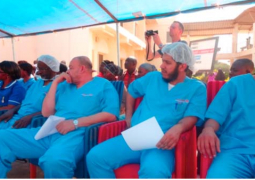Health Matters reproduces it below verbatim.
"I am deeply honored to be associated with this noble profession "health journalism" all geared towards improving and promoting health. Mental Health is the balance between all aspects of life - social, physical, spiritual and emotional. It impacts on how we manage our surroundings and make choices in our lives - clearly it is an integral part of our overall health.
Mental Health is far more than the absence of mental illness and has to do with many aspects of our lives including: How we feel about ourselves, How we feel about others, and How we are able to meet the demands of life.
Poor mental health can affect all of us. The number of people with severe mental health problems has been increasing over the last decade worldwide. This development has great impact on our societies and is a burden to our economies.
Many people in large mental institutions are subject to neglect and abuse of human rights, reflected in high mortality rates. Stigma and prejudice are widespread and affect every aspect of mental health, including whether people seek and receive help. The current economic context associated with urban migration disrupting traditional family and social networks is a contributing factor to the increasing mental health problems.
Mr. Chairman, it is also estimated that more than 400 million people worldwide are suffering from mental illness and neurological disorders. The really bad news is that this is only going to get worse. Rapid global transformation, poverty, and a generalized aging of the world's population will be contributing factors. It is therefore vital for governments everywhere to improve the coverage and quality of mental health services and to combat the social stigma, discrimination, and misinformation associated with psychological disorders. Journalists, Health workers and the communities themselves can play an important role in turning the current tide, by raising awareness, creating a culture of prevention and highlighting the tangible results of physical and mental well-being.
Communities in The Gambia are faced with numerous, mental, neurological, and psychosocial disorders that undermine development.Based on prevalence rates from the World Mental Health Survey, 2004 it is estimated that approximately 27,000 people in The Gambia (or 3% of the population aged 15 years and more) is suffering from a severe mental disorderand a further 91,000 (or 10% of thepopulation aged 15 years and more) are suffering from moderate to mild mental disorder. This means that at least 118,000 people in The Gambia (or 13% of the adult population) are likely to be affected by mental disorders which require varying degrees of treatment and care.
The negative attitudes and prejudices towards mental disorders within all sectors of societyadversely affect the resources provided to treat and care for people with mental disorders at all levels including within the family, community and at national level.
The infrastructure available for mental health treatment and care in The Gambia is the Campama Psychiatric Unit which is the only available inpatient facility for the mentally ill. The lack of facilities elsewhere in the country results in patients traveling long distances from their home to access treatment.Important social support networks for patients are therefore weakened during the patients stay in the hospital.Care at Campama is mainly custodial in nature with the provision of psychotherapy, drug therapy, counseling and rehabilitative facilities.
In The Gambia, many people have very little knowledge about mental disorders and are unaware of the availability of simple and effective preventive, treatment and rehabilitative measures.Some believe that people suffering from mental disorders will never get cured; that they will never be productive members of society; that all mental disorders are the same; that mental disorder is a punishment for which recovery is unlikely; and that those who work with people suffering from mental disorders will themselves become 'crazy'. Many of these erroneous beliefs or misconceptions are held not only by patients, families and communities, but also by journalist and some health professionals.
Mr. Chairman,
These myths perpetuate both stigma and discrimination against the mental disorders giving rise to social adversity, pervasive negative attitudes and prejudices, and at times, the condemnation of people with mental disorders. As a consequence communities (including health workers) are cautious towards those with mental health problems; families are ashamed of having a member with a mental disorder. Although these beliefs are slowly changing, the prejudice against those suffering from mental disorders in terms of lack of inclusion and services still persists. Your job as health journalists is therefore not only to inform but to educate the masses as well.
Despite the intrinsic importance of mental health, some government support in this area is usually inadequate, and mental health is undervalued by society, even though an inner life is specifically what makes human beings human.
Two groups that are especially vulnerable to mental health problems are the victims of domestic violence-both women and children-and older adults, particularly those who have been marginalized by poverty, one or more disabilities, or lack of contact with loved ones and society in general. Yet beyond the more obvious statistics, as WHO experts contend, there are many other categories of people who, because of the extremely difficult circumstances in which they live, are at special risk of being affected by mental health problems. Their situation may further be compounded by their lack of access to health services. This group includes children and adolescents living on the streets, refugees, immigrants etc. In other parts of the world, other vulnerable groups are the victims of prolonged armed conflicts, as in the case of the civil wars and the victims of natural disasters, which in the resent years alone have produced major human tragedies.
One strategy that can increasethe public's awareness of mental health issues is health Journalism to promote the need for culturally appropriate and humane treatment for the mentally ill, lets "Break the silence,"
At the same time, forging new multidisciplinary alliances-between government and non-government agencies, as well as with the mass media will also bolster the efforts of the public health sector to reduce the burden of mental health problems on our society.
Mr. Chairman, ladies and gentlemen, domestic abuse often remains behind closed doors and never becomes part of the formal statistics. This is why; you should be "talking about the problem as the first step toward solving it.
Even in the calmest and most prosperous corners of the world, people are facing a breath-taking pace of newness. Yet with change also comes insecurity, unpredictability, and apprehensions deeply rooted in the human mind. Therefore, it is more imperative than ever that journalist and communities work to ensure mental well-being, a state in which individuals can realize their abilities, can cope with the stresses of life, can work productively and satisfactorily and make a positive contribution.
In the face of rapid change, it will also be a matter of keeping our social fabric intact-of creating cohesive bonds between generations of young and old, and inviting the participation of politicians, teachers, schoolchildren, mayors, police forces, religious leaders, journalists, health workers, men, and women, in the promotion of good health as a preventive measure for all. The goal of mental well-being is worthy of our very best efforts.
I thank you all.



